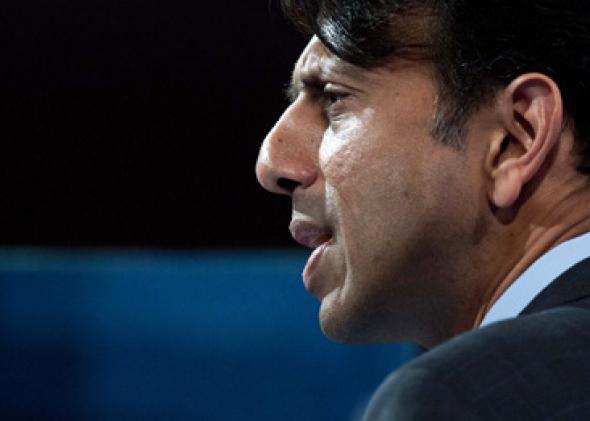Right now, roughly 30 House Republicans are driving the bus in Washington. Along with Sen. Ted Cruz, they have been the “titanium backbone,” as Rep. Marsha Blackburn likes to call it, in the effort to defund Obamacare. They have stood their ground and helped bring the government to a halt. This is either an act of lunacy or a shining example of standing for conservative principle.
As it happens, there are just about the same number of Republican governors across the United States, and their representative was in Washington on the third day of the government shutdown with a very different conservative message: We get things done. “Thirty Republican governors are applying conservative principles,” says Gov. Bobby Jindal of Louisiana, the chairman of the Republican Governors Association. “Here in D.C. they talk about it, but outside the nation’s capital we’re actually doing it. For too long for the Republican governors, we feel like we’ve outsourced our brand management to the Republicans in D.C. It’s time for us to stop doing that. It’s time for us to take control of our own destiny. We want folks to know that when we’re talking about Republicans, it’s not just the dysfunction that’s happening in Washington, D.C., it’s the results that are happening in our state capitals.”
In the roiling debate among Republicans between principle and pragmatism, the governors are weighing in. Jindal was in town to start the launch of a new ad campaign touting the success of the GOP brand in the states. “Republican governors are driving America’s comeback” is the tagline. Their intent is to highlight their solutions-oriented records and get themselves re-elected. In this cause, they are clearly using Sen. Cruz and House Republicans as a foil. When Jindal says, “We are not the party of no,” the first thing that comes to mind is the group that has become associated with that phrase: Republicans in Congress.
In New Jersey, Gov. Chris Christie was selling the same message. After leaving a meeting with Jindal, I received a press release from Christie’s office touting his cooperation with the Democratic Senate leader Steve Sweeney. “A tale of two cities,” it read. “On day three of the government shutdown, folks in Washington are reading headlines like ‘W.H. Meeting With Lawmakers Goes Nowhere.’ … Meanwhile here in New Jersey, it’s a much different story.”
Jindal and the Republican governors are not alone in bashing Washington Republicans. That’s what Sen. Cruz is doing, too. But the GOP governors are making a different case. Their argument is based on results, conservative policies that are sometimes the result of hard-won compromise. Or, in some cases, they are boasting about lawmakers who have pushed for conservative legislation dealing with unions or removing regulatory barriers, but who have also decided to accept federal Medicaid money as a part of Obamacare. That kind of apostasy would not be tolerated by conservative purists in Washington, but it’s also the kind of purity that governors don’t have the luxury for. In 2014 the four biggest governor’s races for Republicans will take place in Pennsylvania, Florida, Ohio, and Michigan. Those Republican governors all sought federal Medicaid funds.*
Jindal isn’t the only one selling the governors. When the Republican Party commissioned its famous autopsy shortly after the 2012 presidential election loss, the bias toward the governors was clear. “At the federal level, much of what Republicans are doing is not working beyond the core constituencies that make up the Party. On the state level, however, it is a different story. … Republican governors are America’s reformers in chief. … It is time for Republicans on the federal level to learn from successful Republicans on the state level. It is time to smartly change course, modernize the Party, and learn once again how to appeal to more people, including those who share some but not all of our conservative principles.”
That was Jindal’s explicit message on Thursday. Though he had plenty of criticism for the president—who he said liked to play the “victim in chief”—his message for his own party was not about the incumbent he disapproves of. In the states, he said, “You see a party that is fighting for every single vote, that is fighting to help the American people join and thrive in the middle class … a party that is not just the party of no, and those are the things that we need to do as a party if we want to earn the right to govern and we want to be a majority party. It’s not happening in D.C. right now, but it is happening in our state capitals.”
There are several ways for the Republican Party to evolve. The new firebrands who have captured the attention of the nation may be at the start of a conservative constitutional revolution in the party. Or they may be taking a party that is shrinking and driving it to an ever-narrower base of Tea Party loyalists that represent about a fifth of the country. Or, Washington is a sideshow and the Republicans in the states who actually have to accomplish something are where the real long-term energy in the party is. That was the message Jindal came to town to sell. It remains to be seen whether he or another pragmatic Republican governor can get back behind the steering wheel.
*Correction, Oct. 4, 2013: This article originally stated that these gubernatorial elections in Pennsylvania, Florida, Ohio, and Michigan were scheduled for 2016; they will take place in 2014. Also, Florida Gov. Rick Scott sought federal Medicaid funding, but the state legislature blocked him. (Return to the corrected sentence.)
